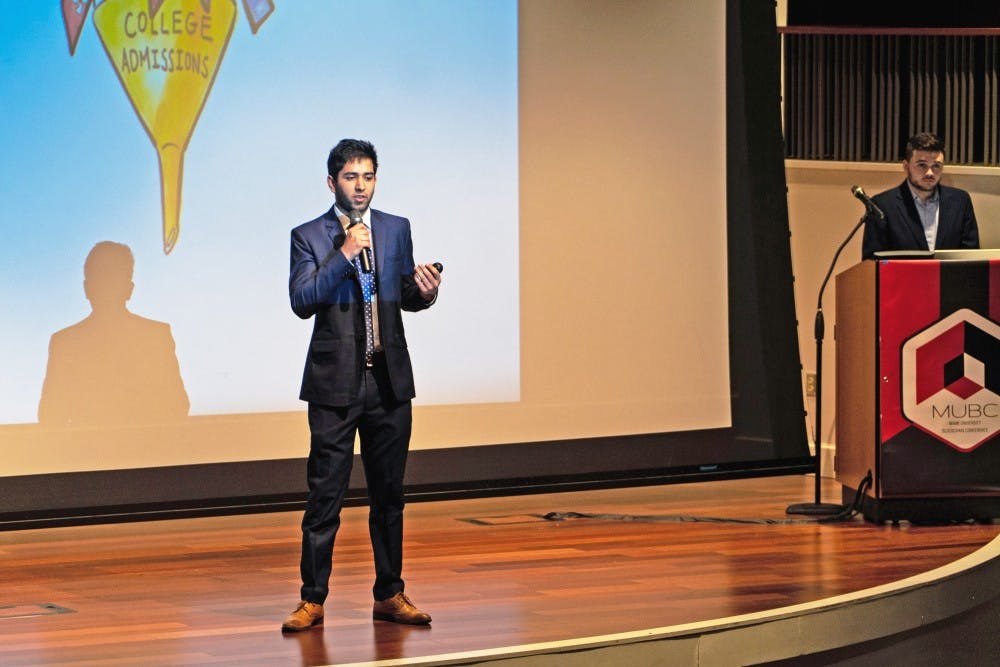You might have heard of Bitcoin, with all the traction it's gained over the past several years as the popular cryptocurrency used by techies everywhere - even to the point that Ohio now lets you use Bitcoin to pay your taxes. What very few people truly understand is the technology that makes it work.
Last Sunday, Miami University's Blockchain Club (MUBC) held their first conference with several experts in the field to discuss the technology . Michael Dowling, the former head of blockchain development at IBM and current CEO of Northwell Health, was the conference's keynote speaker.
Blockchain is the record keeping system behind bitcoin. According to Investopedia, "blocks" are chunks of digital information about particular, unique transactions. Once a transaction is completed and verified, its information becomes part of a block. That block is then added to the blockchain, where it becomes public.
The chief of staff in the Ohio Treasurer's Office, Chris Berry, spoke about government implementation of cryptocurrency and how Ohio citizens are now able to pay their taxes with Bitcoin.
Billy Becker, a Miami junior and finance major, started MUBC last year along with Patrick Young, Jake Salerno and Spencer Applebaum. Young and Salerno are senior marketing and junior architecture majors, respectively, while Applebaum no longer attends Miami. The club has nearly 240 members, and Becker claims it is one of the largest academic blockchain groups in the world.
"I think [bitcoin]'s been really overregulated and didn't necessarily pop, but it got way too big way too fast," Becker said. "The amount of gains people were seeing were just astronomical. Everyone has heard stories about how people put in a tiny bit of money, and now they're millionaires. It's an asset class that has a long way to go and will do well in the future."
As the economic market continues to digitize, developing countries and nations facing economic difficulty now sometimes choose to hedge their bets in cryptocurrency because their own physical currency cannot compete on the global market. For instance, Venezuela has implemented its own form of cryptocurrency in the form of "Petro" that is based on the selling of Venezuelan oil.
"One conversation we had during one of our meetings is that in countries like Iraq, where their currency is nowhere as good as the dollar... Instead of putting your savings in a bank, you literally go home and put it under your mattress," Becker said. "As terrible as it sounds, a buddy of mine has a friend in Iraq whose family did this. Their house burnt down and all of their savings are just gone."
Becker said nations experiencing financial turmoil can find a viable monetary option in Bitcoin.
Despite the "tech bro" allure, the conference was diversely attended.. It was a room full of people from all backgrounds talking about real, digital currency - from business majors to literature students.
Vasanthi Chalasani, the director of IT and Nextgen at Procter and Gamble (P&G), was one of the first presenters of the day. She has spent 20 years with the company and has worked on P&G's use of blockchain over the past 5 years.
Chalasani said that while technology is always innovating and moving forward, it is important that everyone who uses that technology can both understand and trust it.
Enjoy what you're reading?
Signup for our newsletter
"If you don't have good, valuable data, then you just have a technology for the sake of technology," Chalasani said. "The biggest selling point we have for the blockchain is the security of data."
Makayla Sheehan, a first-year business major at Miami, came to the conference as a requirement for her business analytics class. She was assigned to talk about what she learned from one of the speakers, and she said she came out of the experience with a better understanding of blockchain as a whole.
"I went in not really knowing what to expect, and honestly I was not looking forward to it," Sheehan said. "But afterwards, I actually understood what exactly all the hype was about in the business world."




